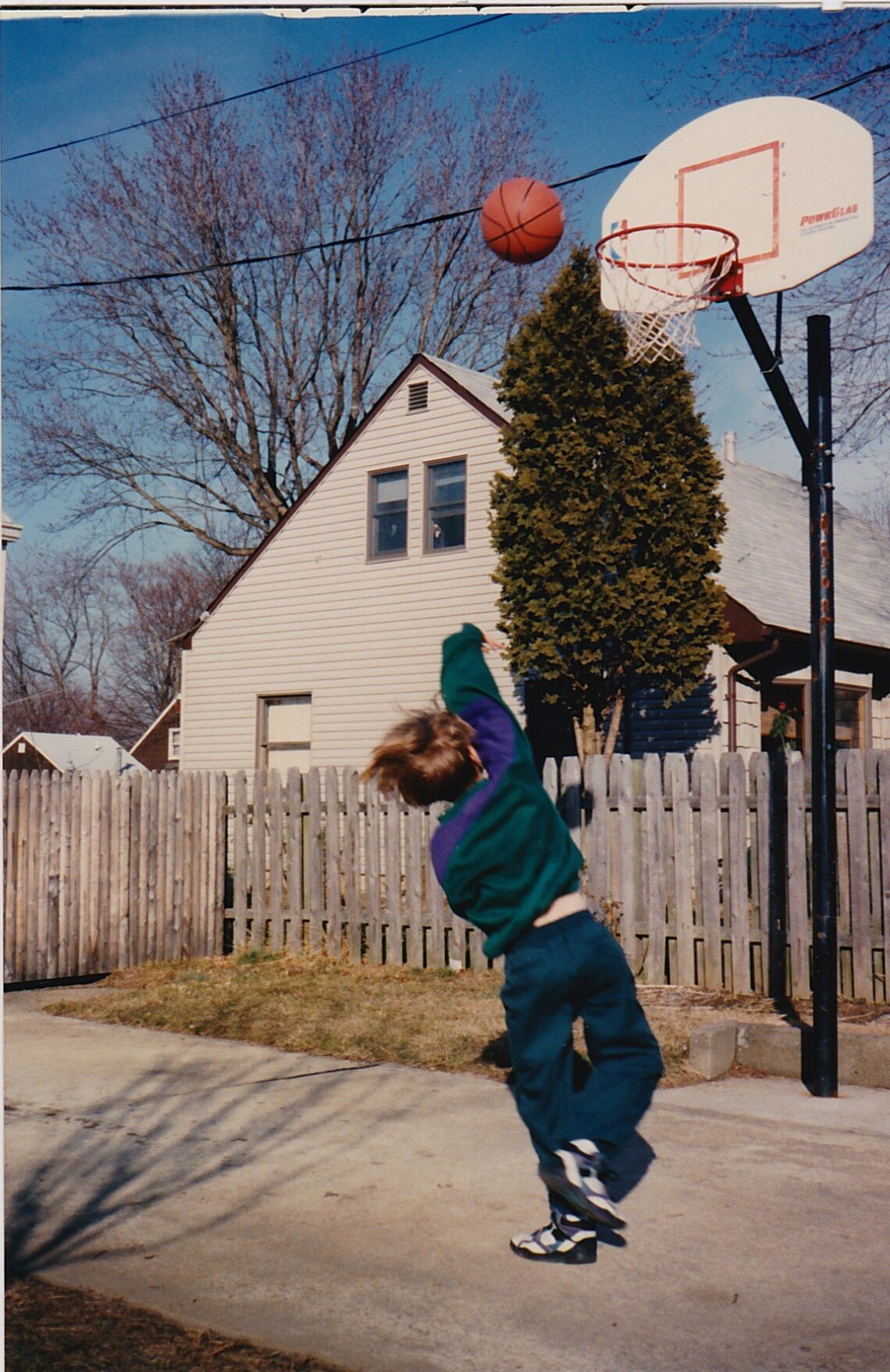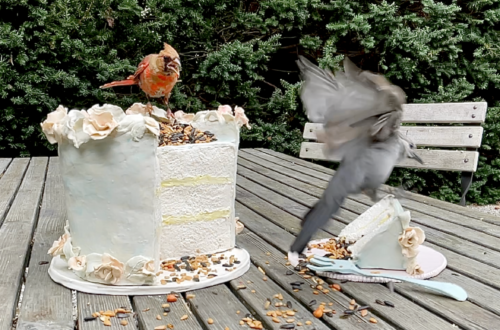
Aim High
photo by Joyce Ellis
by Brian Ellis
No childhood is complete without facing this one question one thousand times at least. It may come from a friendly aunt at Thanksgiving dinner, a well-meaning neighbor from behind the wooden fence or an adult you’ve never seen before and never will see again, but ultimately the person asking you the question is inconsequential. The important part is to have an answer for when the inevitable time comes.
“So…what would you like to be when you grow up?”
Since you are a small child, like 10th percentile or less small, the awaiting adult has to lean over to share the good-natured glint in their eye. While the anticipation mounts, you experience a growing satisfaction for the simple reason that you have an answer at the ready. A teacher, a musician, a marine biologist—these would have all been sensible choices. I mean, the ocean is a mile away, for heaven’s sake. But another has claimed your heart, and there is nothing you can do about it.
“A professional basketball player.”
At this point, the interrogator reacts in one of two ways, either quiet consideration (a chin raise, a head tilt, no words—the most common response) or a persevere-in-spite-of-all-signs-to-the-contrary statement like, “You can be whatever you want to be” (the least common and for good reason, it is a lie).
This desire of yours permeates your entire life. On your powder blue bedroom walls, you have amassed no fewer than half a dozen depictions of Magic Johnson, your favorite basketball player. In one he dribbles to the right. In another he dribbles to the left. In a third he ascends into the air after having, well, dribbled. Nearby, against the door, hangs a Dirty Dunk, or a hoop, backboard and net that combine to form a hamper. This allows you to improve your shooting accuracy while you dispense soiled undies.
In your social life, you develop the strongest bonds with those similarly convinced of their destinies for athletic superstardom. Among your small rotation of friends, a popular topic of conversation is the all-important matter of your future adult height. Since you have no clairvoyants in your circle, and are oblivious to the basics of genetics and the consequences of having average-to-small-sized parents, you fail to glimpse your future adult height of five-feet-eight with orthotics. Rather, one day, as you and a friend rifle through sleeves and stacks of basketball cards, reading the statistics about the more popular players, you listen as he tells you he envisions himself measuring six-six or taller to match up well against other professional basketball players. To your credit, you have more modest expectations. “I’ll be six-four,” you tell him. Six-four is the ideal height for someone who aspires to be a point guard. Too tall and forget about the nimbleness required to successfully move the ball up the court. Too short and good luck in a vertically oriented game. No, you will be a point guard and six-four will be your height.
And for this delusion, for this love of the game so ill suited to your physical constitution, you can thank the summer of your eighth year, broadly known as the summer of 1992. This season has two exceptional qualities: one, no school, and two, the arrival of the men’s Olympic basketball team known as the “Dream Team.” Eleven of the twelve players will become NBA Hall of Famers, and some are already household names: Michael Jordan, Larry Bird, Magic, Charles Barkley, and the list goes on. You are thunderstruck by their performance—the blocks, steals, spin moves, full-court passes, behind-the-back passes, finger rolls, alley-oops, two-handed jams, and three after three after three after three. They win every game by more than 30 points. Seeing this team compete with the best the world has to offer is like watching the Harlem Globetrotters play against your parents.
By the end of the Dream Team’s triumphant gold-medal run, you’ve become convinced that one thing, and one thing alone, will make you whole: your very own basketball hoop. And not the phony kind that hangs atop your bedroom door, but the regulation, 10-feet tall behemoth kind. You share this desire with your parents. Your father is instantly sympathetic, having played on his high school basketball team. He will soon tell you about the time he nearly dunked the ball and you will be impressed. Your mother, too, supports the idea. She senses in you that this is more than just a passing interest. You are astonished and delighted.
When the hoop is installed, it stands the desired 10-feet tall on a shiny black metal pole cemented into the grassy knoll beside the driveway. The rim is old-fashioned, bolted onto the backboard; it does not feature a spring to allow downward momentum from dunking, but since you are four-feet tall, you suspect this won’t be a problem for the next couple years. Above all, you notice the bright red of the hoop and shooting box appearing sharply against the matte white of the backboard.
Your goal is now in sight and it only requires you to arch your neck like an astronomer to view it. No matter. The time has come to get to work.
STEP 1: DEVELOP TECHNIQUE
The first step in the maturation of any young basketball player is to progress from the underhand shot known as “granny style.” This approach shares its name with your meemaw for a reason and unless you are suffering from a raging hernia, avoid it. While certain proponents believe the granny shot more accurate during free throw attempts, ignore them unless you wish to be mocked by your classmates. Also, for every other instance during the game, underhand shots will be blocked without fail.
Case in point, you attempt this shot during your inaugural shootaround in the driveway. Your parents are there, your brother, your neighbor and his small son, the same one who in a few years’ time will swat your face with a Wiffle bat. The novelty of the hoop and the newness of the pastime have brought you all together. When the time comes for your first shot, your brother blocks your heave-ho and from then on granny is dead to you. That day you progress to the two-handed push. Placing the ball in the palms of your hands, you thrust it upward and outward like a shot-put. While this technique has its advantages in both respectability and shot block evasion, it often leads to hitting the underside of the rim and the resulting clang disheartens.
No less discouraging, when you watch games on television, you do not observe a single player using the two-handed push. It is as taboo as the old lady herself. Clearly, to improve accuracy and further your athletic ascension, you must mimic the professionals and develop a proper jump shot. With the aid of your new hoop, you get to work on technique—left hand aims, right hand shoots, both feet leap—day after day, week after week, until shots fall with some degree of consistency. And with each successful attempt, you become increasingly more enamored.
STEP 2: HONE YOUR GAME
With technique established, the next step involves objectively determining your strengths. The key here is to have someone against whom to measure your skill. As the smallest in your family and social circle, you will come to understand that you belong nowhere near the basket or inside the paint. You adapt and become proficient from the perimeter.
Using cracks and grooves in the cement driveway as three-point markers, you line up in and around the arc and shoot over and over. The day’s light appears, lingers and leaves and you are still shooting in the weak reach of the garage light. Most times you do so alone, and by most times, about 98% of them. You have quickly proven yourself better than your brother, more than enough incentive to keep him off the court. Your sister has touched a basketball maybe three times in her life and your mother only a few more than her. You occasionally enlist your father or a friend in a shootaround or a game of Horse, but as a boy on a mission, your calling comes from within. Not even the weather can alter your course. Rain, snow, wind, fog, swelters. If the postal carrier can work in it, you can play in it—unless Mom yells for you to stop, of course. The one consistent obstacle is Dad parking the van under the hoop, though he requires only you asking to move it elsewhere. Thanks be to Dad.
One of the lessons you will learn during these formative years is that no one wants to guard a three-point shooter. They would rather let you shoot, collect their breath and then collect your miss. So you take advantage. And once you’ve established yourself as a threat who must be guarded, you dribble around them and score on a layup. This works wonders during one-on-one play. Add more people to the mix, however, and you encounter another experience entirely.
STEP 3: START TEAM ATHLETICS
Congratulations—you’ve made it onto your first team! Sure, it only required a check from your parents, but that’s recreation basketball for you. Nothing you can do about it. Anyway, what better way to celebrate your tenth year than by graduating from solo to team sports? The next evolution for all budding athletes. Into the gymnasium you go, the middle school gymnasium. You are not even a middle schooler yet. The ascent has begun. Soak in the gloss of the tan floorboard and the squeak of your sneakers pivoting against it. Observe the green and yellow court lines, the pull-up bars and rolled-up wrestling mats along the periphery, and, of course, the basketball hoop extending out from the blue and white walls as though in the act of beckoning. The time has arrived to show everyone what you can do, to earn the attention you crave and the admiration that drives you to excel.
Unfortunately, you do not. Equally unfortunate, your enthusiasm begins to wane. Not because of your diminutive stature, though your height is not your friend, but because your teams are dreadful. You have a losing record the first year and lose every single game the second. The teams are so bad, in fact, that for one game each season you score all the points. Imagine that. Without you, your teams would have been shut out. You have never heard of such an event transpiring in a four-quarter game of basketball. But don’t get too cocky, you. Remember, your team lost that second game 56 to 4. You watched your fellow blue-shirted Pistons miss every conceivable shot. Free throws, lay-ups, bank shots, jumpers and three-pointers that wouldn’t even have counted for three points if they’d made it. When the final minutes mercifully ticked away, far from being the selfless team player, you secretly hoped your teammates would continue to miss so you could claim this dubious distinction again. They did not let you down.
Also, let us dispel the notion, if one should exist, that you carried your team. For each season, you scored a grand total of 10 points, or slightly above 1.0 points-per-game. In other words, you turned a time-honored statistic into a grammatical error. Despite all the daily hours you have devoted to the sport, all the hard work and lofty expectations, you have no choice but to accept your meager return on investment. This disappointment reaches its apex at the end of the second season when you have the following conversation with a player on the opposing team nearly responsible for shutting yours out. The player, understand, is one year your junior.
“How many points did you score this season?” he asks, impressed that you have shouldered your team with a two-bucket performance.
You waver. “How many did you?”
“Twenty six,” he responds.
“Yeah. Me too.”
You have lied and unambitiously.
STEP 4: DREAM
During these years, you begin having a dream—a nightmare, really—that will recur for the rest of your childhood and into adulthood. It is the middle of a game. You are standing beneath your team’s basket. The ball is in your hands. Remarkably, the nearest defender is at the opposite end of the court. You are all alone. At last, an opportunity to improve your points-per-game and with the same layup you have perfected in the driveway, missing only one in ten, one in fifteen attempts. You shoot. You miss. The ball doesn’t even touch rim. It bounces off the backboard without a sound. You look over your shoulder and the other team is charging in your direction. You still have more than half a court of separation so you grab the ball and shoot again. It ricochets off the rim. You run and gather it. The opposing team has crossed midcourt like a stampede. You have time for one last shot but panic and throw up the worst one yet, nothing but air. As you catch your own miss the team descends on your position and you wake in a start.
Each time you awaken from this dream, you will wonder why you couldn’t have made the basket just this once. You will also think, with a sigh, Well, at least I made three rebounds.
These are your dreams. The playground of your imagination. Where nothing should prohibit your performance or prevent you from lighting up like a superstar, and yet you play even worse than normal.
If your dream can’t even come true in your dreams, then where else could it?
STEP 5: PUSH FORWARD
You are undeterred by your two seasons of meager output. You are still practicing, still getting better. Now is not the time to give up. You are in your prime.
Having entered middle school, you receive encouraging news in health class. The teacher informs everyone that soon the stage of life called puberty will begin and redefine your body. When it does, you will grow taller and—let’s face it, that is all you needed to hear. Still, keep in mind that some people may reach this stage earlier than others, the teacher forewarns. So for you “late bloomers,” do not get discouraged.
During times of doubt, when you waver from the belief that you’ll ever measure among the vertically elite, you remind yourself of the success stories of diminutive players. Five-seven Spud Webb winning an NBA slam dunk contest. Five-three Muggsy Bogues simply playing in the league at all. That’s about it as far as success stories are concerned, but that’s all you need.
The same year, you have the opportunity to try out for the school basketball team for the first time, the sixth and seventh grade squad, but respectfully decline. The thought of having to shower with other boys makes you nervous and, good God, self-conscious. You see another way forward, and one that will allow you to keep your clothes on 100% of the time: recreation basketball, again.
The next three seasons go by in a haze, hardly distinguishable. Your points-per-game average drops from 1.0 to 0.0 for all three seasons. Yes, you have found a way to make that statistic even less grammatically correct. Meanwhile, you have become well acquainted with the bench, experiencing what you will come to call fatigue of the gluteus. It is not for a lack of trying. You attend every practice, every game. You are never late. You work hard, both in the driveway and during practice. It is not for a lack of utility. Your father volunteers as assistant coach and drives players to and from games. He would not do this without your presence. No, the real reason is because you are, you know, short. Sorry, but it’s really to your disadvantage this time.
By the start of the eighth grade season, several of your fellow players measure six feet in height or taller, while you haven’t even reached five. For your first shot in a game, you have wisely chosen a three-pointer, putting your tried-and-true stratagem of old to use. When you square up to shoot, your defender is between you and the basket, miles away. You will show him what happens to those who underestimate you. As you jump so too does your defender, and despite being in the bleachers, he blocks your shot anyway. You do not attempt another all season.
Muggsy Bogues is a crock of shit.
STEP 6: GIVE UP
You are aware of the stigma. Quitters are among the least liked people living today. But what are you supposed to do? You’re in ninth grade and still haven’t reached five feet. That teacher who said growth would come to late bloomers really deserved their B.S. degree. Also, you hate being on a team. The last two seasons you dreaded when coach called you out onto the court during a game, dreaded the siege of anxiety. You had never experienced this feeling playing basketball before and—wait, isn’t a game supposed to be fun? The closest you’ve come to fun was warming the bench because there the pressure dissipated. At the start of the school year, you realize this game is not obligatory like attending school. This game is voluntary, and this game is over.
Your father takes the news rather poorly. Not outwardly, mind you, he does not often display emotions, but through tacit cues your older self will interpret. He stands in the threshold to your room, head lowered for an extended period, struggling to find words. The walls of this room have been stripped of all basketball imagery and replaced with the red and gold of football fandom. In a year, not even that will remain.
“Are you sure?” he finally speaks. You answer affirmatively and without hesitation. Your dad has enjoyed being an assistant coach these past five years. Attending practice and games. Filling in for the head coach when needed. Driving players around. Driving you around. “You know, I’m sure there’s still time to sign up if you—”
“I’m done,” you tell him.
He says nothing more and soon leaves the room.
STEP 7: MOVE ON
In place of afternoons and evenings spent playing basketball and baseball (the latter you have also quit and for similar reasons), you christen ninth grade with a new and invigorating pastime: sleep. That’s right, it’s not just for nighttime anymore. Often, during the school week, as soon as you get home, you toss your backpack onto your bedroom floor and get to work. If you thought your last three years of basketball blurred into nothingness, oh man, just wait until high school.
For the first two years, when you do manage to get out of bed, you do so for some typical teenage activities. A part-time job. Watching TV. Listening to CDs. Feeling an aimless depression. Playing the guitar. Okay, the last four you often do while in bed, but you get the idea. Fortunately, patience will pay off this time. Junior year life begins to align when you attempt noncompulsory writing for the first time, penning poetry about unrequited love your older self will deem “horrendous.” Ignore him. You relish the creative process and expressing your otherwise secret self, so keep going. Something worthwhile will come.
In the meantime, despite your waning interest, the basketball hoop remains in the driveway, unmoved. Some days you venture outside to practice your jumper because it’s there and you can. Also, deep down, you still enjoy it. And when not placed against gargantuan athletes, you’re actually pretty good.
In gym class senior year, for example, you surprise your fellow classmates by competently handling the ball, executing crisp passes and sinking numerous three-pointers—all while remaining among the smallest on the court (though mercifully above five feet). You even make one shot while tripping over your shoelaces.
But far and away, the top play on your highlight reel comes when you face off against that showboat baller man-to-man. Every school has a kid like him—they swear they are the greatest, or at the very least far greater than you. This one is a few inches taller, a few pounds heavier and has an all-around more athletic build than you. You two are playing in a three-on-three game, and he is defending against your dribble, offering you the lane to the basket. He did this a couple minutes earlier and when you took advantage, he blocked your overhand layup from behind. The other players see your opening and leave you two in isolation, interested in what you will do. Most times when you are embarrassed, you seek an immediate refuge, escape. Often just the possibility of embarrassment, from a joke not landing, from feelings going unreciprocated and being broadcast to others, is enough to keep you from acting. But somehow, basketball is different. You drive to the hoop again and as your opponent readies himself for another easy block, you do the unprecedented and bring out granny from retirement. Your underhanded layup avoids his outstretched arms, banks off the backboard and drops into the net. Both teams light up with “damns” and “aww shits,” humiliating your would-be defender without you having to say a word.
Around this time a baller in school you barely know says you should have tried out for the varsity team. You smile and think, You know what, I’m good, and mean every word of it.
STEP 8: SAY GOODBYE
You pick up the phone and on the other end a voice says, “Would you mind if we took down the basketball hoop?”
You are 26. A hollow feeling ripples inside you like a lone bounce in an empty gymnasium.
You were expecting a “Hi…how’s the new job?” since you just relocated across the state to start one. But in all fairness, your mother has been exceedingly patient. The hoop has occupied a part of her yard for 18 years, undermining every attempt she has made to beautify it. In the years since high school graduation, you have played sporadically, nowhere near enough to warrant its existence. You consent but ask her to wait until after your next visit, so you can have one more shootaround.
When that moment arrives, you approach the driveway, ball in the crook of your arm. Unlike the inaugural shootaround, this last one involves you alone. You arch your neck. The pole’s former sheen is now largely rust. The backboard no longer has any visible shot markers, the red having vanished long ago; the hue resembles a decaying tooth, a chip like a cavity on the bottom corner. Yet despite everything, the basketball hoop stands unwavering.
As you begin shooting, you notice the same old cracks in the driveway and line up behind them. Mere vestiges of your former skill and accuracy remain, but that’s not the reason for this. More to the point is how each basket you do make produces the same gratifying sensation it always has.
After about a half hour, you decide the moment has come for your final shot. When you miss that shot, you continue until your final made shot. You try once and twice more to the same outcome. These are only eight footers. Your younger, smaller self shakes his head. You spot up in front of the basket for another short jumper, and this time a swish follows and this time the rim emits a sharp metallic eeeeeek sound, collapsing under the brief and infinitesimal weight of the rubber ball passing through it. When the rubber smacks the cement, the rim is pointing downward—toward you—hanging limply in the air.
You do not collect the ball.
You do not move a limb.
You simply stare upwards, speechless.

Brian Ellis is a writer and editor based in Roanoke, Virginia. A graduate of the Hollins University Creative Writing MFA Program in 2022, Brian’s writing has appeared or is forthcoming in the Chicago Quarterly Review, The Coachella Review, and Halfway Down the Stairs. His short story, “Life Ltd.”, was recognized as an honorable mention in Story Unlikely’s 2024 Short Story Contest. He is currently at work on a collection of personal essays that explores childhood, adulthood and the unfortunate decisions made along the way.
Photo of author by Cindy Kane Photography




